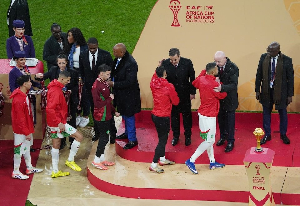A GNA Feature by Mildred Assifuah
Accra, May 18, GNA - As one walks through the corridor of every upper, middle or lower class home, one would come across either a male or a female child who can be said not to be a part of that family. The signs are often clear. He or she is either cutting the hedges in the compound; fetching water; cooking; washing; scrubbing; cleaning shoes; bathing and feeding the dogs among other things while biological children of owners of such homes would be doing home work from school; playing with friends at the playground or watching television. Such children are often bombarded with whole lots of household chores that, they least have time for themselves. Their social life then becomes a life of sorrow, depressive and grief.
The promise by these people to send such children to school, take good care of them and help in their total development are always less realised as against inhuman and hard treatment.
In Ghana the practice of domestic servants had gain root and had now become a business venture for some unscrupulous men and women, who act as middlemen in the trade.
Most children in child labour now can be linked with internal trafficking by such middlemen, who give them out to somewhat rich individuals to engage them in exploitative business.
A document made available to the Ghana News Agency by Child Labour Unit of the Ministry of Manpower Youth and Employment said an estimated total of 1,273,294 (20%) of children in Ghana are engaged in child labour.
Out of the 2,474,545 (39%) of children engaged labour, 6,361,111 are into economic activity with over 1,031,220 children under 13 years. In Ghana, the largest proportion (57%) of working children are in agriculture, hunting and forestry; 20.7 per cent in sales; 9.5% into production and 11 per cent in other general workers such as porters, truck pushers and driver-mates.
The records showed that 242,074 children engaged in Worst Forms of Child Labour work in dangerous and hazardous environment, exposing them to injuries, toxic substances, sexual abuse, violence and even death. This revelation is a sure contradiction of what is stipulated in the Children's Act of 1998, which vehemently frowns on such practice. The Acts stipulated to ensure the rights of children especially children of school going age has not been enforced strictly to deal with perpetrators of this crime.
The figures also indicated that boys dominated sectors like fishing; commercial agriculture; mining and quarrying while girls were used in domestic work, as potters, Kakayes, selling, chop bar workers and prostitution with its attendant diseases.
About 91 per cent of both parents of working children, according to the document were alive, which showed a gross shirking of responsibility or the state of poverty among parents especially rural parents, who often gave their children out.
The child trafficking has become so lucrative that it is now rated as the third most profitable business aside drugs and small arms. The practice has gained an international recognition according to an expert with UNICEF, Mr Eric Okrah.
He said children are exported to as far as Ivory Coast, Nigeria and United Kingdom among other places. These children according to him were 'packed' into specially made cars and injected with drugs, which made them lose contact with their environment. In effect they fall into deep sleep till they get into their destinations.
He stated that children according to the Acts were expected to only engage in light and normal works till they are above 16 years but often times these trafficked children engaged in hard, hazardous and exploitative work.
Looking at child trafficking from two main perspectives, he gave it criminal and human right dimension, which makes it an offence for one to engage in the practice and at the same time trampling upon the fundamental human rights of the affected person. Elvina Quaison, Child Advocacy Officer working with Africans Unite against Child Abuse (AFRUCA), an NGO based in the United Kingdom, told the GNA about how African children were trafficked to the United States of America.
"Children are trafficked all over Africa from Ghana, Zimbabwe, Nigeria among other places to the US to work their head out which often times results in atrocities and brutalities"
Elvina told the story of a lady, Victoria who was trafficked all the way from Zimbabwe to the United State to suffer cruelty from her Mmadam, who eventually killed her.
"This gingered the formation of AFRUCA to fight against cruelty against African Children in the US", she said.
Locally, there is an NGO working in this area especially in the Brong Ahafo and Volta Regions and others parts of the country to stop the practice of child labour and trafficking. Mr Jack Dawson, Executive Director of Association of People for Practical Life Education (APPLE), said these endemic areas of country were densely populated with rural fishermen and farmers, who were often enticed to give their children out.
Recently according to him, he rescued more than 20 children from bounded child labour with financial support from international benevolent establishments.
Mr Dawson's wish was that the law enforcing agencies were strengthened more and more to tackle the situation. Slavery is no more in the system, but another form of it is gradually roaring its head (human or child trafficking) and if not checked and stopped would soon become the modern day slavery with its increasing problem and challenges requiring huge investment to curtail or eliminate completely. 18 May 07














